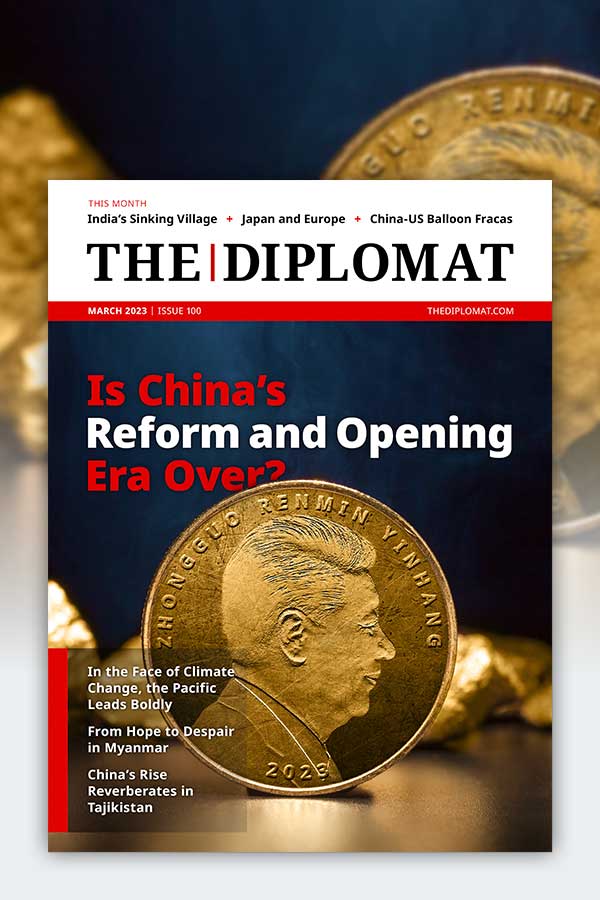| Welcome to the latest issue of Diplomat Brief. This week our top story explores Turkmenistan’s kinda-sorta leadership transition. We also have an interview with Michael Wesley, the deputy vice-chancellor international at the University of Melbourne, on the legacy of the Regional Assistance Mission to Solomon Islands (RAMSI). |
| Story of the week |  | Politics The Aura of Governance in TurkmenistanWhat Happened: On March 12, Turkmenistan officially elected a new president. The result was no surprise; a month earlier, long-time leader Gurbanguly Berdimuhamedov had announced his retirement, and he passed the reins to son Serdar after a tightly choreographed election. But the power transition was diluted by the elder Berdimuhamedov’s decision to reconfigure Turkmenistan’s governing structures earlier this year. Now Gurbanguly’s position as chair of the People’s Council outranks his son’s role as president, raising the question of why they bothered with a transition in the first place. Our Focus: Gurbanguly’s decision to step down as president was part of a longer-term transition process that saw Serdar take on ever-higher ranking positions in the government. The Berdimuhamedovs would have been watching closely as strongmen in Kazakhstan and Uzbekistan failed to secure the line of succession, leaving their families on the losing side of regime change. Clearly, the Berdimuhamedovs want to position Serdar as a long-term successor, cementing the family dynasty. But Gurbanguly seems reluctant to actually cede any real control. The purpose of the recent government “reform,” argues Victoria Clement, a historian and scholar focused on Turkmenistan, “is to codify what was already the case: Serdar may occupy the office of the president, but his father still runs the country.” What Comes Next: Given the incomplete nature of the power transition, Turkmenistan has not yet solved the fundamental problem: What will happen once Gurbanguly dies? “As time moves on, Turkmenistan watchers should pay attention to what Serdar is allowed to do as a barometer for the degree of control he retains,” Clement writes. “...This is a case of hereditary authoritarianism. The family continues to consolidate power with no motivation to change anything for the better.” And as long as that remains the case, “there will be no significant improvement in lives of the Turkmen people and only the illusion of good governance.” Read this story |
| Behind the News | INTERVIEW Michael WesleyMichael Wesley, author of “Helpem Fren: Australia and the Regional Assistance Mission to Solomon Islands,” on the uniqueness of RAMSI in Australia’s foreign policy history: “RAMSI is also an initiative confined to a particular period in history, when Australia was relatively confident, wealthy, and decisive in its dealings with the world. It is unlikely that Australian governments would even contemplate an initiative of that scale and risk today.” Read the interview |
| This Week in Asia | Northeast Asia South Korea’s President Heads to JapanFollowing last week’s unveiling of a plan to resolve a dispute over wartime forced labor, South Korean President Yoon Suk-yeol will head to Japan for a summit on March 16 to 17. It will be Yoon’s first visit to Japan, the first visit by a South Korean president since 2019, and the first purely bilateral visit in over a decade (President Moon had visited Osaka for the G-20 summit). But behind the scenes, domestic political opposition in both Japan and South Korea may still prevent a real thaw from taking hold. Find out more | South Asia Will the TTP Launch a Spring Offensive?The Pakistani Taliban, or TTP, have ramped up attacks in Pakistan since their ideological allies took over Afghanistan in August 2021. Pakistani authorities have been pushing the Afghan Taliban to deny the TTP assistance and sanctuaries ever since, to no avail. The latest demand, brought by a high-powered Pakistani delegation visiting Kabul, was more specific: prevent the TTP from announcing a spring offensive. The announcement – or lack thereof – in the next few days will be a key sign of the Afghan Taliban’s willingness to address Pakistan’s concerns. Find out more | Southeast Asia Former Malaysian PM Charged With CorruptionMalaysia’s former Prime Minister Muhyiddin Yassin has been charged with multiple counts of corruption, becoming the country’s second former leader to be indicted for graft after leaving office. Late last week, Muhyiddin pleaded innocent to four counts of abuse of power and two counts of money laundering linked to a government COVID-19 relief program. This was followed by a seventh charge on Monday. The 75-year-old, who was in power from March 2020 until August 2021, has painted the charges as politically motivated, an issue that now seems set to dominate the string of state election campaigns scheduled to take place later this year. Find out more | Central Asia The Central Asians Drawn Into Russia's WarAs early as March 2022, a month into Russia’s invasion of Ukraine, there were reports of ethnic Central Asians dying in the conflict. By the fall, when Moscow announced a “partial mobilization” and set up recruitment operations at migration centers, it had become clear that Russia was enticing Central Asians into joining up with pay and promises of citizenship. Regional governments strongly warned their citizens against doing so. The latest deaths have been of Uzbek citizens, previously serving prison sentences in Russia, who ended up dying instead in Ukraine. Find out more |
| Visualizing APAC |  | Over half of Taiwan’s remaining diplomatic allies are located in Latin America and the Caribbean, with Paraguay as the lone partner in South America. See the full picture |
| Word of the Week | Security သွေးသောက်Thway Thout, Burmese for “blood comrades” or (more literally) “blood-drinkers,” refers to a civilian militia group created around April 2022 to assist the military’s fight against resistance groups in in Myanmar's central dry zone. Find out more |
|  |




